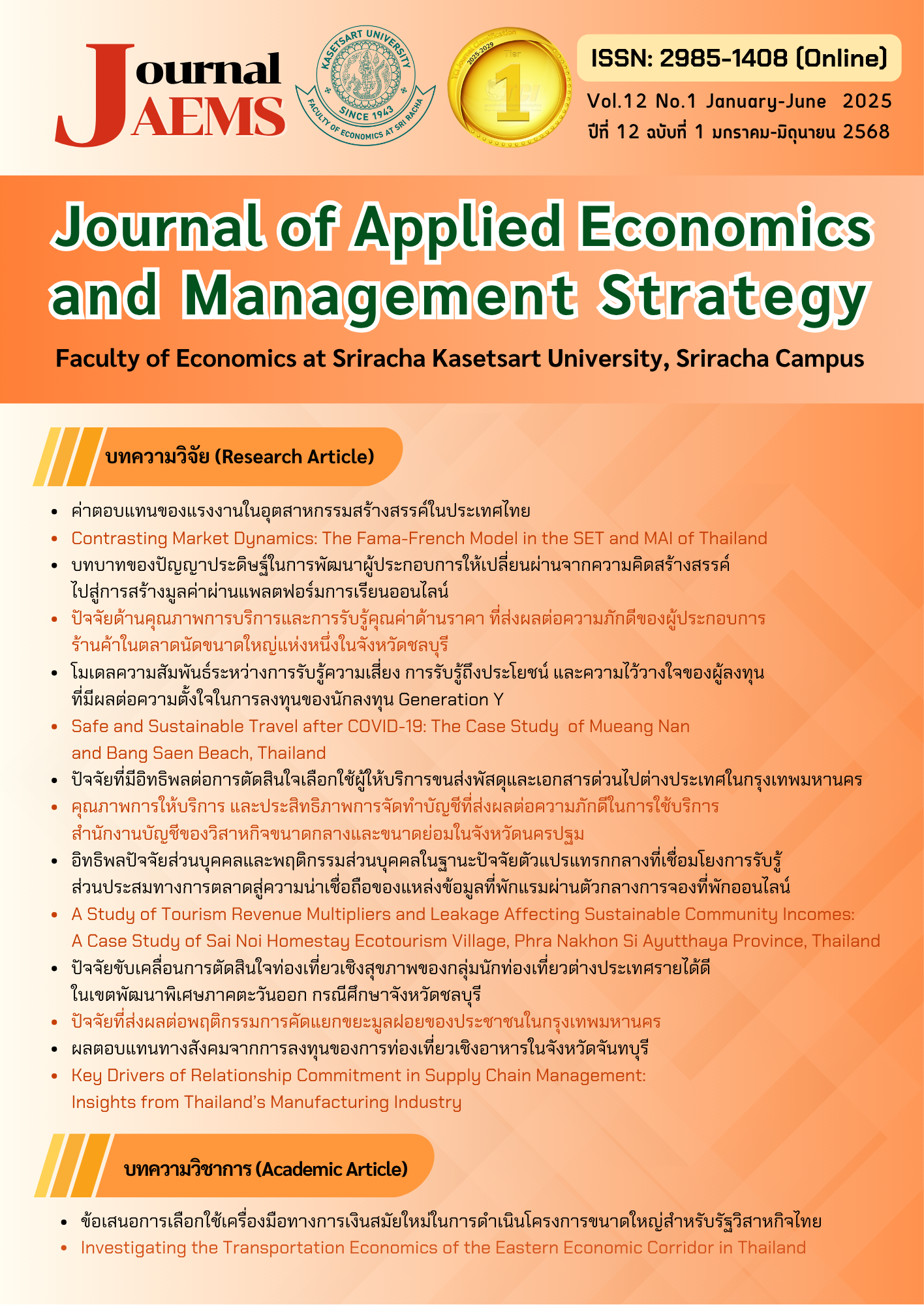Social Return on Investment of Gastronomy Tourism in Chanthaburi Province
Main Article Content
Abstract
This study aims to develop an outcome mapping of a food tourism project in Chanthaburi Province and assess its social impact. Using both ex-ante and ongoing evaluation approaches, the research incorporates focus group discussions and in-depth interviews with 91 stakeholders, alongside questionnaires completed by 900 participants and other affected individuals. The analysis covers the project's activities, outputs, outcomes, and both tangible and intangible impacts-whether intended or unintended.
The findings indicate that the project contributed to: (1) sustainable income generation for farmers, restaurant operators, and food entrepreneurs; (2) the promotion of safe and environmentally friendly agricultural practices; (3) improvements in community well-being; (4) expansion of tourism, particularly food tourism; and (5) establishment of partnerships and cooperative networks for local development. A social impact assessment conducted for the period 2023–2027, applying a discount rate of 3.5%, estimates a net present value of 274,533,440 Thai Baht (THB) and a social return on investment (SROI) ratio of 6.81. These results suggest that the project yields substantial benefits that outweigh its costs, making it a valuable and sustainable investment.
Downloads
Article Details

This work is licensed under a Creative Commons Attribution-NonCommercial-NoDerivatives 4.0 International License.
References
การท่องเที่ยวแห่งประเทศไทย. (ม.ป.ป.). เส้นทางสายกิน อาหารถิ่นในตำนาน. สืบค้นจาก https://api.tat.or.th/upload/multimedia/ebrochure/file/live/Gastronomy-Tourism-TH-EN-1540883529.pdf.
ขจรอรรถพณ พงศ์วิริทธิ์ธร, วลัยลักษณ์ พันธุรี, ชวลิต หงสเลิศสกุล และประยูร อัสสกาญจน์. (2566). การประเมินผลตอบแทนทางสังคมจากการลงทุน (SROI) ของโครงการฟื้นฟูเมืองชุมชนดินแดง. วารสารวิจัยและพัฒนา มหาวิทยาลัยราชภัฏกำแพงเพชร, 10(2), 49-61.
ขิตพงษ์ อัยสานนท์ และนันทพันธ์ วิเศษเเก้ว. (2567). ปัจจัยที่มีผลต่อการตัดสินใจเลือกการท่องเที่ยวเชิงอาหารของนักท่องเที่ยวไทยใน 5 ภูมิภาคของประเทศไทย. วารสารนวัตกรรมทางธุรกิจและสังคม, 1(2). 90-102.
ดนวัต สีพุธสุข, วีณา ลีลาประเสริฐศิลป์, วิลาสินี ธนพิทักษ์ และบัณฑิต ทองสงฆ์ (2567). การประเมินผลตอบแทนทางสังคม (SROI) ผ่านการท่องเที่ยวชุมชน เสริมพลังความเป็นไปได้ในการแก้ปัญหาครัวเรือนยากจน. วารสารพิพัฒนสังคม, 1(2), 51–70.
ทัศนีย์ นาคเสนีย์, รุจิรา แสงแข และอมรพิมล พิทักษ์. (2565). ผลตอบแทนทางสังคมจากการดำเนินธุรกิจวิสาหกิจชุมชนเพื่อส่งเสริม การท่องเที่ยวเชิงกีฬาในการจัดงานวิ่งจอมบึงมาราธอน กรณีศึกษา ศูนย์การเรียนรู้อยู่เย็นเป็นสุข วิถีไทยรามัญ. วารสารลวะศรี มหาวิทยาลัยราชภัฏเทพสตรี, 6(1), 88-105.
นภาพร หงษ์ภักดี และสืบพงศ์ หงส์ภักดี. (2566). การประเมินผลตอบแทนทางสังคมจากการลงทุนสำหรับโครงการพัฒนาผู้ประกอบการทางวัฒนธรรม ด้านภูมิปัญญาการทำเทียน ในพื้นที่ย่านเมืองเก่า จังหวัดอุบลราชธานี. วารสารมนุษยศาสตร์และสังคมศาสตร์ มหาวิทยาลัยนครพนม, 13(3), 149-167.
สมหมาย อุดมวิทิต. (2562). การวิเคราะห์ต้นทุนและผลตอบแทนในการพัฒนาการท่องเที่ยวอย่างยั่งยืน ในพื้นที่ป่าสงวนแห่งชาติป่าวังน้ำเขียว-ป่าเขาภูหลวง. วารสารเศรษฐศาสตร์และกลยุทธ์การจัดการ, 6(2), 141-158.
สฤณี อาชวานันทกุล และภัทราพร แย้มละออ. (2560). คู่มือการประเมินผลลัพธ์ทางสังคมและผลตอบแทนทางสังคมจากการลงทุน. กรุงเทพฯ: สำนักงานกองทุนสนับสนุนการวิจัย.
สำนักงานสถิติจังหวัดจันทบุรี. (2566). รายงานสถิติจังหวัดจันทบุรี พ.ศ. 2566. สืบค้นจาก https://chanthaburi.nso.go.th/images/ebook/Chanthaburi%20Provincial%20Statistical%20Report%202566_compressed.pdf.
Arvidson, M., & Kara, H. (2013). Putting evaluations to use: from measuring to endorsing social value. Third Sector Research Centre Working Paper 110, Retrieve from https://www.researchgate.net/publication/279061827_Putting_evaluations_to_use_from_measuring_to_endorsing_social_value.
Emerson, J., & Wachowicz, J. (2000). Social Return on Investment (SROI): exploring aspects of value creation in the non-profit sector. Investor Perspectives, Chapter 8, 131-173. Retrieve from https://redf.org/wp-content/uploads/REDF-Box-Set-Vol.-2-SROI-Paper-2000.pdf.
Millar, R., & Hall, K. (2013). Social Return on Investment (SROI) and Performance Measurement: The opportunities and barriers for social enterprises in health and social care. Public Management Review, 15(6), 923-941.
Moron, D., & Klimowicz, M. (2021). Using the social return on investment (SROI) as a measure of the effectiveness of social innovation projects implemented under public policies. Social Enterprise Journal, 17(2), 302-327.
